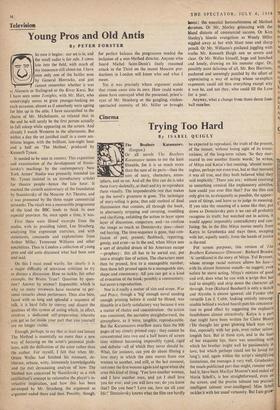Television
Young Pros and Old Antis
By PETER FORSTER It needed to be seen in context. This exposition and examination of the development of Stanis- lavsky's teachings by the contemporary New York Actors' Studio was primarily intended (as Mr. Tynan insisted in an introductory article) for theatre people—hence the late hour. It marked the sixtieth anniversary of the foundation by Stanislavsky of the Moscow Art Theatre, and it was promoted by the three major commercial networks, The result was a memorable programme of the kind the BBC tends to think its own especial province. So, once upon a time, it was.
First there were filmed excerpts from the studio, with its presiding talent, Lee Strasberg, analysing free expression exercises, and with statements, comments and explanations from Arthur Miller, Tennessee Williams and other notabilities. Then in London a collection of young pros and old antis discussed what had been seen and said.
On this I must tread warily, for clearly it is a major difficulty of television criticism to try to discuss a discussion. How to tackle, for other example, the Brains Trust? Question by ques- tion? Answer by answer? Impossible, which is why so many reviewers have recourse to per- sonal remarks about performers. Thus also here, faced with so long and splendid a sequence of talk, it is hard fully to convey and dissect the qualities of this system of acting which, in effect, involves a dedicated self-preparation whereby you get so far inside your part that you yourself are no longer visible.
Enough, perhaps, to say that at least and lowest The Method is essentially no more than a new way of focusing on the actor's perennial prob- lems, with the deification of the actor rather than the author. For myself, I felt that when Mr. Orson Welles had finished his resonant, de- liberate, urbane, witty, immensely knowledgeable and (to me) devastating analysis of how The Method was conceived by Stanislavsky as a rich intellectual's attempt to rationalise the player's in- structive inspiration, and how this has been developed by Mr. Strasberg, the argument as argument ended there and then. Possibly, though, for perfect balance the programme needed the inclusion of a non-Method director. Anyone who heard Michel Saint-Denis's finely reasoned attack in the Third on the recent Moscow pro- ductions in London will know who and what I mean.
Yet it was precisely where argument ended that vision came into its own. How could words alone have conveyed what the possessed, priest's- eyes of Mr. Strasberg or the gangling, rimless- spectacled intensity of Mr. Miller so brought borne: the essential humourlessness of Method devotees. Or Mr. Morley grimacing with the bland distaste of commercial success, Or Kirn Stanley's blonde evangelism as Wendy Hiller niggled away at her with blunt nose and sharp penciL Or Mr. Williams's pixilated juggling with truths Mr. Kenneth Haigh saw so severe and clear. Or Mr. Welles himself, huge and hunched and lonely, drawing on his monster cigar. Or, possibly most delicious of all, Mr. Rex Harrison, puckered and seemingly puzzled by the effort of appreciating a way of acting whose so-explicit exponents could tell him everything except why it was he, and not they, who could fill the Lane for a year.
Anyway, what a change from those damn foot- ball matches.






















































 Previous page
Previous page